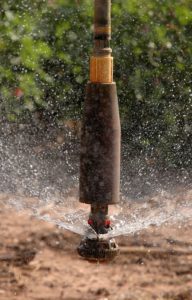Water rights seminar to address who gets dwindling reserves
Contact: Dr. Guy Fipps, 979-845-7454, [email protected]
McALLEN – A powerhouse speaker’s panel highlights the 2017 Seminar on Water Rights and Public Policy – The Waters of the Rio Grande to be held from 11 a.m. – 2 p.m. Oct. 25 at the McAllen Convention Center, 700 Convention Center Boulevard in McAllen.
Concerns about how dwindling water supplies are distributed once reservoirs start running dry will be one the topics covered in the upcoming seminar, according to Dr. Guy Fipps, a Texas A&M AgriLife Extension Service irrigation engineer and professor in the biological and agricultural engineering department at Texas A&M University in College Station.
Management of the Rio Grande River is complex and includes both state and federal agencies as water inflows from both sides of the border are combined and divided between Texas and Mexico, Fipps said.

“There are few concerns when water is plentiful,” he said. “But when supplies tighten, as they periodically do, it becomes apparent there is insufficient supply to meet agricultural, municipal and industrial water demand.”
The panel includes the chairman of the two Texas state agencies with primary responsibilities for regulation and managing the Rio Grande: Bryan Shaw, chairman of the Texas Commission on Environmental Quality, and Bech Bruum, chairman of the Texas Water Development Board. Both are based in Austin. Rounding off the panel is Edward Drusina, commissioner of the International Boundary and Water Commission in El Paso, which regulates the division of water between Texas and Mexico.
To address concerns of both agricultural and municipal users, Fipps will moderate an open discussion among the three officials. The seminar is presented by AgriLife Extension and the Lower Rio Grande Valley Water District Managers Association.
“We didn’t assign specific topics to our speakers,” Fipps said. “Instead, we’re hoping to engage them in frank discussions with stakeholders about water rights and policy.”
Fipps said he began holding these periodic water seminars in 1991 as educational events to explore the intersection of water rights and the need for policy to ensure fair use and availability of water.
“The last water rights seminar we had in the Lower Rio Grande Valley was about three years ago,” he said. “While some of the water availability issues remain the same, questions continue to be asked about whether the U.S. and Mexico are living up to their obligations in the treaty, which defines the division of water between the two.
“In the Lower Rio Grande Valley, the irrigation districts also deliver the raw water to municipal water treatment plants. Another unresolved question is how will cities get water when an irrigation district runs out of water? Our hope is that this seminar will help stakeholders better understand the mechanisms in place and the legal basis for allocation and management of water from this shared resource.”
Registration is $40 and includes lunch. Participants are asked to register in advance as seating is limited. Preregister online at http://AgrilifeRegister.tamu.edu and enter keywords “Water Rights Seminar.”
The seminar is being held in conjunction with the Lower Rio Grande Irrigation Conference on Oct. 26 in Mercedes.


